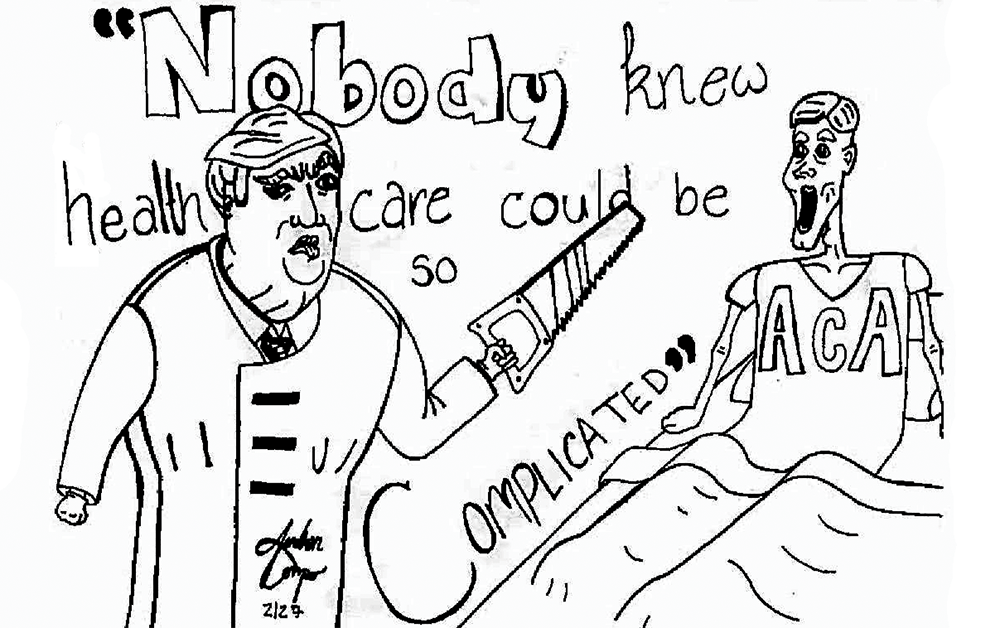On Super Bowl Sunday, something unprecedented in American history occurred: A sitting president of the United States drew a moral equivalency between the United States and Russia.
In a pregame interview with Fox’s Bill O’Reilly, President Donald Trump seemed to defend Russian President Vladimir Putin. When O’Reilly questioned how Trump could respect Putin despite the allegations that he is “a killer,” Trump responded,“There are a lot of killers. We’ve got a lot of killers. What do you think? Our country’s so innocent?”
It is imperative to understand the implications of Trump’s claims. Essentially, Trump justifies his respect for a “killer” by leveling the moral playing field. If the United States is just as guilty as Russia, it follows that Putin should be treated as an equal, not a criminal. Were Trump more familiar with the grim realities of Russian political life, perhaps he would realize the true significance of drawing such a comparison.
One need only look at the news coming out of Moscow over the past few weeks to see what kind of country Putin leads. On Feb. 8, opposition activist Aleksei Navalny, known for his exposes of regime corruption, was convicted for defrauding the government, effectively barring him from running in the 2018 presidential elections. The charges are highly dubious, since the verdict mirrors word-for-word a 2013 conviction against Navalny that was overruled by the European Court of Human Rights just two months ago.
Meanwhile, another Kremlin opponent lies in an intensive care unit. On Feb. 2, democracy activist Vladimir Kara-Murza entered the hospital in critical condition, experiencing severe organ failure. This follows a 2015 incident, in which he suffered from similar symptoms as a result of acute poisoning “of an unknown source.” Before his hospitalization, Kara-Murza had been touring the country, presenting a documentary about Boris Nemtsov, the liberal politician who was gunned down near the Kremlin in 2015.
Although these events have elicited concern among members of Congress from both parties, the White House has thus far remained mostly silent. When asked about Kara-Murza’s hospitalization, Press Secretary Sean Spicer responded that “the State Department is aware of it, and we’re monitoring it.”
Considering that the President has weighed in critically on everything from Nordstrom to Saturday Night Live, his lack of criticism toward a man most political leaders condemn as a “butcher” and “thug” is all the more telling. Possibly, this is because Trump himself sees the United States as not “so innocent.”
This conclusion has such resonance because it reflects the truly sad reality that the United States fails to live up to its values all too often. On Feb. 12, a preliminary United Nations investigation suggested a U.S. airstrike in Afghanistan killed 18 civilians, nearly all women and children. At home, the land of the free continues to have the highest incarceration rate in the world, disproportionately affecting men of color.
While an op-ed can hardly capture the depth of injustice perpetrated by the United States, the essential point is this: When we as a country look in the mirror, it is impossible to ignore the blood on our hands. But we must not believe that our guilt defines us, for unlike Putin’s Russia, we are more than a country of killers.
Admitting the United States has its own killers does not mean that our country’s failures invalidate its promise. It means that we must strive all the more to fulfill this promise. How we live out our ideals is flawed, not the ideals themselves.
Renewing our commitment to this promise is what separates the United States and Russia. Only when our failure to uphold our values leads us to give up on these values entirely will we truly become Russia’s moral equivalent.
Alejandro Perez-Reyes is a senior in the College.














